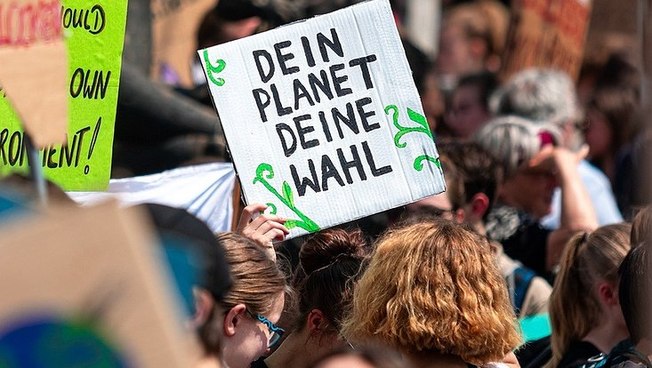7 May 2024
New studies on society and decarbonizationPolitical Risks Endanger German Climate Transformation

Photo: pixabay/dmncwndrlch
Sociologist Aykut and his team have now looked at the German climate transformation. They undertook an analysis that included key factors, or “social drivers.” “The climate-neutral reconstruction of Germany promotes existing interests, habits, and business models. So it is societal processes that impede the climate transformation while also then driving it,” says Aykut. A new series of studies is being set up to examine these processes. The series is being funded by the foundation Stiftung Mercator. The current and first study looks at German, European, and global climate policies; climate protests and court cases; and a comprehensive climate transformation in Germany.
Positive ideas from civil society
The results are sobering: previous political measures are not sufficient for achieving the long-term climate transformation. There is now a broad range of legal instruments available, emissions are sinking, renewable energies are increasing, and the majority of German society supports climate protection in principle. However, there is no long-term guarantee for current reductions in emissions and political risks are increasing: German and European debtor rules and fiscal policies restrict the options for climate-friendly investments. And striving right-wing populist parties reject climate protection measures generally.
There are some positive ideas from members of civil society: the climate movement has become more diverse and can rely on a broad solidarity throughout society. There have been pioneering courtroom victories, such as the European Court for Human Rights’ latest ruling that sided with a group of Swiss senior citizens who fought to have insufficient climate protection recognized as a human rights’ violation. The court’s decision is part of a broader trend towards progressive climate law. Courts, however, cannot achieve climate protection on their own. Thus, the best hope is to bring together positive developments in politics, civil society, and law so they mutually reinforce one another and advance climate protection.
Nations must play new roles
However, the options within civil society are becoming increasingly restricted: “When protest possibilities and financial sources are restricted, it is problematic with regard to the necessary societal support for the climate transformation,” says Aykut. There are also more social conflicts over the distribution of resources—see, for example, the protests about the heating statutes or the dismantling of diesel subsidies. Against this backdrop, passive support for climate protection is not sufficient. “To successfully achieve the climate transformation, we need not only new technologies and markets, we also need new ways of working, doing business, and consuming,” says Aykut. This includes changing roles for the state and strong support from civil society.
“Our analysis is not intended to discourage but to raise awareness of the necessity of a broadly shared social commitment to climate protection,” explains Dr. Lars Grotewold, head of the climate protection section at Stiftung Mercator. “The annual publication of the study is an opportunity for strategic reflection by political and societal players on how to shape the social conditions to at least get closer to the agreed-upon climate goals.”
Download Aykut S, Hüppauff L, Frerichs L, Fünfgeld A, Walter Y, Aguirre F, Mollyk A, Ritterbach L (2024): Klimawende Ausblick 2024. Gesellschaftliche Treiber der Transformation in Deutschland. Band 1. Klimapolitik, Klimabewegung und Klimaklagen. Universität Hamburg https://uhh.de/wiso-klimawende
The study is part of the climate transformation prognosis Klimawende Ausblick supported by Stiftung Mercator. Successive publications will look at socially relevant key factors, such as company strategies, consumer patterns, divestment, and media. The basis for the studies is the Hamburg Climate Futures Outlook, an annual study conducted by CLICCS at Universität Hamburg. CLICCS developed the framework for the worldwide analysis of the social drivers of the climate transformation. Researchers look at which developments (“climate futures”) are not only possible the world over but also, within the scope of social predictions, plausible.
Thanks to the funding from Stiftung Mercator, Universität Hamburg is working on applying the model to Germany. The findings will be consolidated under the aegis of the Stiftung Mercator Professorship for Sociology and published in an annual report on the social dynamics of the German climate transformation.
The Cluster of Excellence Climate, Climatic Change, and Society (CLICCS) is funded by the German Research Foundation. It is based at the Center for Earth System Research and Sustainability (CEN) at Universität Hamburg and cooperates closely with 11 partner institutions, including the Max Planck Institute for Meteorology, the Helmholtz-Zentrum Hereon GmbH, and the German Climate Computing Center. CLICCS regularly draws on its basic research to provide recommendations for policymakers.
